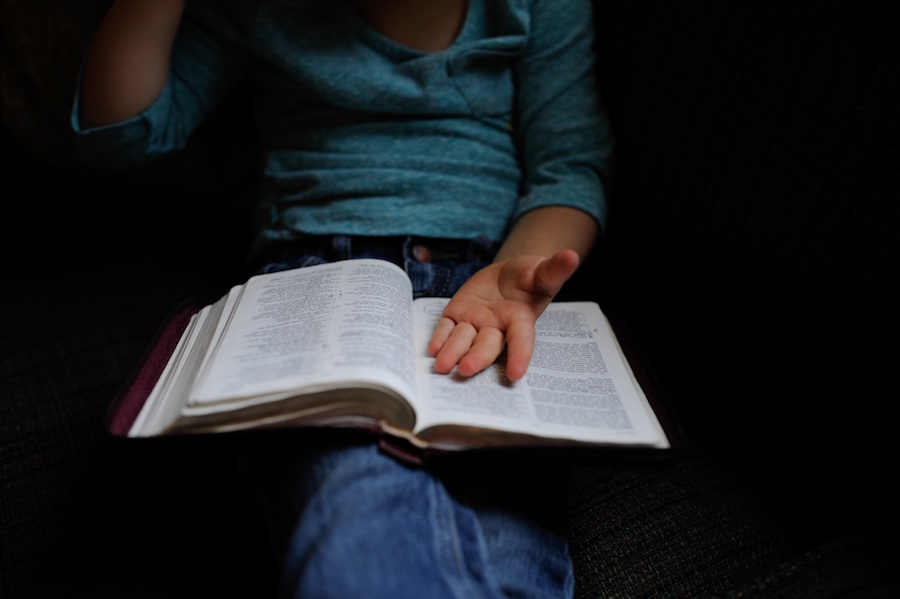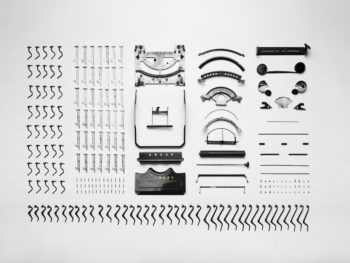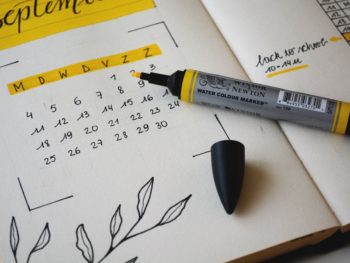
When I need a Bible, I reach for my husband’s.
It’s leather-bound with his name embossed on the front. His parents gave it to him. Tucked inside is a fabric cross his mom needle-pointed with a few spindly pink irises. Parts of the spine are cracked and peeling off glossy finish, and it has a few dog-eared pages, but it’s a solid Bible, with decades left of wear in it.
In that way, it’s a lot like mine.
My Bible is upstairs. It’s also an NIV translation, also slightly dog-eared and worn, also given to me by my parents, also with precious mementos tucked inside.
Except I open it less and less.
The main difference between the two copies is what’s written inside. In my husband’s Bible, the pages contain only the Scriptures, the text itself, the study notes, the printed material.
Mine, on the other hand, is filled with tiny, anxious handwriting: underlining, sermon notes, exhortations I wrote to myself in college, and underneath it all, a yearning. A terrible, terrible yearning.
Because when I wrote all that marginalia back in college, I thought the effort would transform me. I thought the way I read the Bible would save me. I thought studying Scripture would help me, would purify me, would redeem me. I thought knowing the Bible would fix me. I thought doing all of that well, often, enough would bring me before the throne of grace itself.
And that’s how I read that leather-bound Bible. With a panicked urgency and a harsh discipline, daily, as though I might use each verse to scrape my heart clean.
I abandoned the practice after college, when I started therapy for depression and old hurts. I closed that Bible and I put it away, and I didn’t open it again for years. I got healthier.
And I thought, every so often, that I would try again. Not to read the Bible as a substitute for Jesus, but with soft eyes and gentleness. Knowing that it could be life-giving.
I would open my Bible, hoping I could find some happy medium between nothing and obsessive compulsion.
But invariably, the anxiety would start a few days in. I would dread that Bible. Reading it always took me back to the fear I’d felt before.
I would try harder, and harder, until I recognized that I was back in the fear and compulsion that had driven me away from the Bible in the first place.
So I’d put my Bible away again, and feel like weeping.
***
About two years ago, something changed. One afternoon, I gave up reading the Word again, and I wondered, seriously, if I could even call myself a Christian. After all, what did you call a believer that couldn’t open a Bible?
Later that night I couldn’t sleep. I made my way downstairs with the thick blanket of failure weighing down my heart.
I usually feel better after I stretch, so I did a sun salutation. On a whim, I turned it into body prayer, imagined raising my arms up to Jesus, bowing before him.
And then I fell apart when I got to child’s pose.
“Oh, Jesus, help,” I cried. “I don’t want to leave you. Please don’t leave me. I just don’t understand why I can’t read your Word.”
There in the dark, I felt God draw near to me, and I realized that I had no reason to be afraid. It wasn’t the Bible I was longing for, anyway. It was Jesus.
***
What changed after that day is I stopped being afraid, and I started paying attention.
I noticed that I felt hungry for the scripture set to music. For Bible verses tucked into liturgy like jewels. I noticed that when I read the Psalms, they broke me down and put me back together all at once. I noticed that when I opened the Bible when I felt hungry, it fed me. And if I didn’t feel hungry, it made me panic.
The more I paid attention to my soul crying out in pleasure or pain, the more I loved the Bible.
And I noticed, after a long, long time, that if I opened a Bible that was free of my past, I wouldn’t cringe when I read it.
Perhaps someday I’ll get a new copy of Scripture for myself. I’d buy something plain, without study notes, maybe in a different translation. Maybe I’d press a few flowers into its pages or ask my daughters to make me some bookmarks out of ribbons.
But for now, I’m keeping things simple. It feels good to make do with my husband’s Bible, and navigate its slightly unfamiliar edition, and remember his mother as I flip through it, and read, with relief, its wonderfully plain pages.
Originally written for Cara Strickland’s site.














 the surprising gift of resentment
the surprising gift of resentment